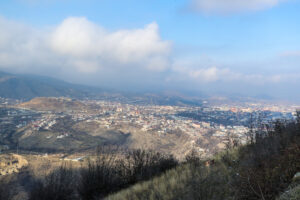In a considerable upheaval of regional dynamics, Azerbaijan’s offensive on 20 September 2023, which targeted the de facto Republic of Artsakh and culminated in the reassertion of control over Nagorno-Karabakh by Azerbaijani authority, inflicted a profound shock on Armenia’s geopolitical landscape. The exodus of approximately 100,000 ethnic Armenians fleeing towards Armenia underscored the situation’s severity, compelling Armenia to confront its geopolitical vulnerability and reassess its strategic priorities. The realisation of being largely isolated and lacking steadfast allies prompted Armenia to embark on a deliberate course of action aimed at distancing itself from the Russian sphere of influence. This strategic pivot reflects a profound recalibration of Armenia’s foreign policy objectives, necessitating a comprehensive analysis of the opportunities and challenges inherent in forging closer ties with Western powers amidst a volatile regional landscape.
Armenia’s relationship with Russia had been under strain prior to the September 2023 attack, as Prime Minister Pashinyan openly criticised Russia for its perceived inactivity in the region, particularly regarding earlier attacks from Azerbaijan. This tension further escalated when Pashinyan engaged in high-profile meetings with prominent Western leaders such as Nancy Pelosi and Emmanuel Macron, signalling Armenia’s growing inclination towards democratic reforms and closer ties with the West. Despite Armenia’s membership in the Collective Security Treaty Organization (CSTO), traditionally aligned with Russia, Armenia’s decision to send humanitarian aid to Ukraine highlighted its increasing dissatisfaction with Moscow‘s policies.

The breaking point arrived with the September attack and Moscow’s perceived indifference towards Armenia’s plight. In a swift response, Armenia took decisive actions to assert its autonomy. On 14 November 2023, Armenia formally ratified the Rome Statute of the International Criminal Court, signalling its commitment to international justice and accountability. This move carries significant implications, as it suggests that Armenian authorities would be obligated to take legal action against Russian officials, including President Putin, if they were to enter Armenian territory. The following day, Prime Minister Pashinyan boycotted the CSTO summit, a bold move that underscored Armenia’s growing disillusionment with the organisation and its willingness to assert its sovereignty.
During the Munich Security Conference, Pashinyan met with several Western leaders. However, his meeting with Prime Minister Albin Kurti of Kosovo was very unexpected. Both leaders shared pictures together on their respective social media accounts, and notably, Pashinyan referred to Kurti as the “Prime Minister of Kosovo,” despite Armenia not officially recognising Kosovo. On the official website of the Prime Minister of Armenia, it was stated that “The Prime Minister of Kosovo expressed his support for the Armenian people in the context of the developments of recent years, noting that both nations historically have been going through a difficult period.” This development is particularly intriguing, especially considering that the Banjska attack in Kosovo occurred only six days after the attack in Artsakh. The meeting of Kurti and Pashinyan further represents Armenia’s shift towards the Western world.
Moreover, the French Minister of Armed Forces visited Yerevan this February. During the visit, he expressed France’s support for Armenia, stating that “France wants Armenia to know it has its back.” Agreements were also signed on military cooperation and arms sales. Additionally, there have been reports from several sources indicating a future visit by President Zelensky to Yerevan. Amidst these developments, Pashinyan has issued warnings of a looming full-scale war being prepared by Azerbaijan, with speculations suggesting its objective could involve creating a land corridor towards Nakhchivan.
Prospects for NATO and EU Membership
Despite Armenia’s great effort in realigning its foreign policy, there remains a long journey ahead. Firstly, withdrawing completely from the CSTO is quite a challenge, as Armenia would face extreme pressure in that scenario.
A NATO membership would be highly unlikely. Membership could possibly be vetoed by Turkey or conditioned with the withdrawal of the claims on the Armenian genocide committed by Turkey, and building a connection route to Nakhchivan, which would allow Turkey to have access to Azerbaijan and Central Asia.
Although the granting of the candidate status to Georgia by the EU indicates that there is room for other members from the Caucasus, EU membership also seems very unlikely at present. This is due to Armenia’s crucial need for liberalisation, reforms, and democratisation. The process will take years, if not decades. Furthermore, conflictual zones, or areas where conflict may arise in the future, usually are not granted candidate status until these issues are fully resolved.
Armenia is making significant progress in its struggle to secure itself through strengthening ties with the West. While these small steps are important, it is clear that there is a much longer road ahead. The prospects for now appear to be low, but greatness comes from small beginnings. Armenia’s attempts to shift towards the West are another result of Russia’s failing security architecture. This further proves the CSTO’s lack of credibility.
Despite these circumstances, it remains an unfortunate reality that Russia currently stands as the sole actor capable of averting future conflicts in the region, whether we find this agreeable or not. This is primarily due to the limited extent of Western influence in the area, coupled with ongoing Western interests in Azerbaijan, particularly regarding energy cooperation. A potential full-scale war aiming to establish a land corridor to Nakhchivan would sever Armenia’s connection to Iran, a significant emerging ally for Russia. Such an outcome would not align with Russia’s strategic interests. Thus, Armenia finds itself in a solitary position for the time being, pending further consolidation of its ties with the West.
SOURCES: Al Jazeera, Eurasia Net, France 24, Politico, the International Criminal Court (ICC) Website, Reuters, Tass – Russian News Agency, The Kyiv Independent, and The Prime Minister of the Republic of Armenia Web Site.

Rron Dragidella
Rron Dragidella, a senior researcher from Kosovo and final-year International Relations student at Corvinus University of Budapest, contributes as a writer for the Frontliner. Specializing in European Integration, he brings a deep understanding to his analyses of global geopolitical and security dynamics.
With a keen interest in history complementing his grasp of current affairs, Rron offers a distinctive perspective on international issues. His insightful contributions promise to blend historical context with contemporary developments, providing Frontliner readers with a comprehensive and enlightening view of the forces shaping our world.

